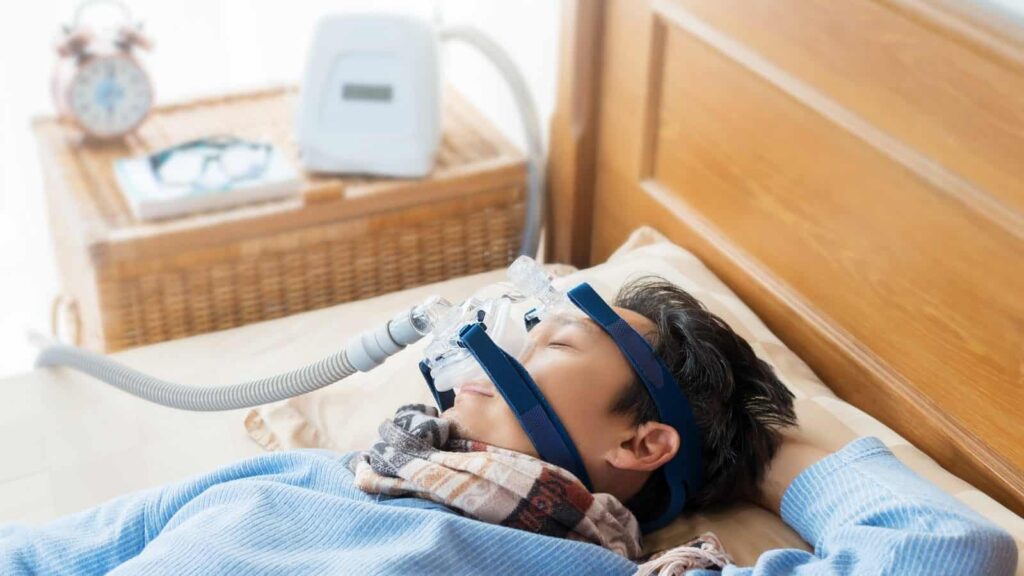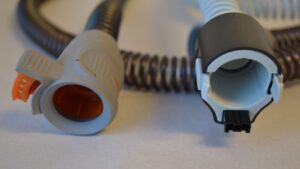Sleep problems, especially sleep apnea, have long been a major public health concern in most parts of the world. According to the Australian Institute of Health and Welfare, almost half of Australian adults (about 48%) have one time reported at least two sleep-related disorders. In the United States, over 22 million people currently suffer from sleep apnea, with 80 percent of these cases being moderate to severe undiagnosed obstructive sleep apnea (OSA).
Sleep apnea is now being recognised as a severe and even fatal condition that it is. However, much work needs to be done in terms of recognising and addressing its hazards. Continuous positive airway pressure (CPAP) with a CPAP mask is a frequent and conventional therapy for sleep apnea.
During the night, people wear a cpap mask over their nose or both the nose and mouth. A pipe connects the masks to a tiny machine. The equipment forces pressurised air into the people’s airway as they sleep to keep it open.
Continuous positive airway pressure is a type of treatment that has been shown to be beneficial for sleep apnea. Even though it is beneficial, compliance with this therapy remains a challenge. In reality, up to 83 percent of peoples do not comply with CPAP therapy. While the typical CPAP usage is five to six hours per night, many people use it for less than four hours.
Related: Got CPAP machine problems? Use these tips
Studies suggest that more than six hours of treatment per night results in normal levels of self-reported and objectively evaluated daytime drowsiness, as well as significantly enhanced daily performance and memory. Despite this, many people do not wear their masks for a variety of reasons. It’s often because it’s uncomfortable to wear. As a result, it’s critical that people be at ease with their mask. This can be achieved with a better designed CPAP mask. You can shop for one from Air Liquid Healthcare online store.
Two Categories of CPAP Masks Below are Some You Might want to Consider.
CPAP Mask for the Whole Face
In contrast to nasal pillows and nasal masks – which only seal on the nose, the full-face mask covers your mouth and nose. It covers a wider portion of your face, forming a CPAP seal over both airways. Although the bulky size of these masks may be uncomfortable for some people, they are ideal for individuals who demand greater pressure or who breathe through the mouth.
A physician may recommend full-face CPAP masks to individuals who predominantly breathe through the mouth, or those who have allergies or other medical conditions that make it difficult to breathe through the nose, or those who sleeps on their backs.
Advantages of a Full-Face CPAP Mask
Peoples who breathe via the mouth benefit from full-face CPAP masks. These masks aid people who have recurrent congestion owing to cold symptoms, allergies, or nasal blockages. Full-face masks that cover the entire face are commonly preferred by claustrophobic peoples, despite the fact that you only touch the exterior of your faces. This is in contrast to nasal CPAP masks and nasal pillows, which either contact the bridge of the nose or fit directly into the nostrils.
Secondly, full-face masks are ideal for higher CPAP pressure settings because the larger mask surface area makes the pressure appear less direct and therefore more acceptable to the people.
The masks are also great for peoples who sleep on their backs since this posture provides the finest air seal when using a full-face mask. However, the additional support and straps assist even restless sleepers in keeping their mask in position.
The Drawbacks of a Full-Face CPAP Mask
- For poorly designed masks, there might be air seeping from the top of the mask. With this, some people report itchy or dry eyes.
- People who prefer to sleep on their stomach might find it difficult to do so due to the bulkiness/weight of the mask and the risk of it becoming disoriented in that position.
- The mask makes it difficult for peoples to wear glasses to watch TV or read.

CPAP Nasal Mask
The nasal CPAP mask wraps over people’s nose from the bridge to the top lip. This provides indirect airflow to the airway through the nasal mask and is useful for people who require greater pressure settings.
The nasal CPAP mask provides numerous adaptable alternatives for people and it is a preferred option between the bulky full-face CPAP mask and the lightweight nasal pillow. Peoples who move around a lot in sleep may benefit from nasal CPAP masks, according to professional advices.
The Advantages of Using a Nasal CPAP Mask
- A wide range of styles to accommodate almost any facial feature or structure.
- Indirect and natural airflow are two advantages of nasal CPAP masks.
- It is useful if you roll about when sleeping.
- It outperforms nasal pillows at higher pressure settings.
The Drawbacks of Using a Nasal CPAP Mask
Nasal CPAP masks are not a good option for mouth breathers unless they are combined with a chin strap that keeps your jaw and mouth locked. Users may notice discomfort from mask pressure on your forehead or bridge of your nose in some situations. If you have a cold or a history of allergies, nasal obstruction may interfere with pressure delivery.
A nasal mask may not be the ideal option for you, if you have difficulty breathing through your nose owing to medical issues such as a deviated septum, a restricted or collapsed nasal valve, or enlarged turbinates.
What you should know while selecting a CPAP mask.
Fit and comfort are all important factors to consider when choosing a CPAP mask. If your mask isn’t comfortable, doesn’t fit, or doesn’t suit your breathing needs, you’re unlikely to provide much solution to your CPAP therapy. Make sure to go through the best masks and know that there’s nothing wrong with switching to a different mask later on if necessary, if the one you’re using is no longer convenient.
If you’re well informed about CPAP therapy and are proactive in your CPAP treatment programme, you are more likely to succeed. Have a positive attitude regarding your therapy. You’ll be more alert, have better overall health, and live a better life once you begin the treatment for your sleep apnea problem.
Almost 48% Australian adults suffer from sleep apnea. Choosing the appropriate CPAP mask is critical for your treatment effectiveness. The CPAP masks products offered for sales on Air Liquid Healthcare online store fits perfectly and are efficient for your sleep apnea issues.
Adherence to PAP is critical. It improves the chances of therapeutic success. As a result, you must educate yourself on how to improve and monitor PAP compliance.

